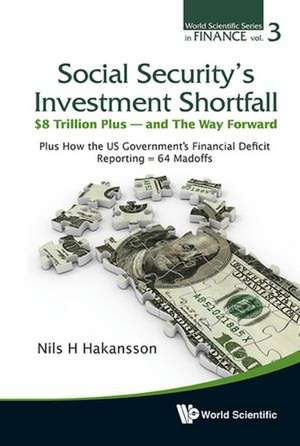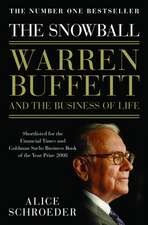Social Security's Investment Shortfall: World Scientific Series in Finance, cartea 03
Autor Nils H. Hakanssonen Limba Engleză Hardback – 16 sep 2012
Din seria World Scientific Series in Finance
-
 Preț: 277.83 lei
Preț: 277.83 lei - 15%
 Preț: 604.33 lei
Preț: 604.33 lei -
 Preț: 242.11 lei
Preț: 242.11 lei -
 Preț: 250.08 lei
Preț: 250.08 lei - 18%
 Preț: 915.46 lei
Preț: 915.46 lei - 18%
 Preț: 699.41 lei
Preț: 699.41 lei - 18%
 Preț: 839.55 lei
Preț: 839.55 lei - 15%
 Preț: 444.06 lei
Preț: 444.06 lei -
 Preț: 257.57 lei
Preț: 257.57 lei -
 Preț: 366.87 lei
Preț: 366.87 lei - 15%
 Preț: 665.19 lei
Preț: 665.19 lei - 18%
 Preț: 1071.11 lei
Preț: 1071.11 lei - 18%
 Preț: 1011.94 lei
Preț: 1011.94 lei - 15%
 Preț: 588.22 lei
Preț: 588.22 lei - 15%
 Preț: 595.48 lei
Preț: 595.48 lei -
 Preț: 315.77 lei
Preț: 315.77 lei
Preț: 259.40 lei
Nou
Puncte Express: 389
Preț estimativ în valută:
49.65€ • 52.37$ • 41.37£
49.65€ • 52.37$ • 41.37£
Carte tipărită la comandă
Livrare economică 02-16 ianuarie 25
Preluare comenzi: 021 569.72.76
Specificații
ISBN-13: 9789814407960
ISBN-10: 9814407968
Pagini: 129
Dimensiuni: 155 x 231 x 15 mm
Greutate: 0.41 kg
Editura: World Scientific Publishing Company
Seria World Scientific Series in Finance
ISBN-10: 9814407968
Pagini: 129
Dimensiuni: 155 x 231 x 15 mm
Greutate: 0.41 kg
Editura: World Scientific Publishing Company
Seria World Scientific Series in Finance
Cuprins
The aim of this book is to document, on a solid and convincing foundation, two public policy mistakes of the United States Government that have been extremely costly. First, the failure to combine stocks with long-term government bonds in the Social Security Trust Fund, the way other nations do, has resulted not only in an investment shortfall well into the trillions of dollars, but has also reduced US and global economic growth and increased the national debt. Second, by employing the Unified Budget concept beginning in 1970, the US Government has since then understated its financial deficits by more than $4 trillion and in doing so it has shielded the increase in the debt owed to the public by roughly half. This study puts forth the notion of Social Security as a minimal safety net is consistent with the views of both Adam Smith and Friedrich Hayek and that private social security accounts are inefficient and subject to moral hazard and huge productivity losses. It also introduces a novel approach to long-term investing suitable for perpetual funds consistent with the empirical phenomena of risk premia and mean reversion, including no asset sales and the use of short-term borrowing on a rollover basis to cover negative net inflows. The study also proposes that payroll taxes be re-labeled Social Security Contributions and that the Social Security System be made independent and professionally managed based on the Federal Reserve System model.












